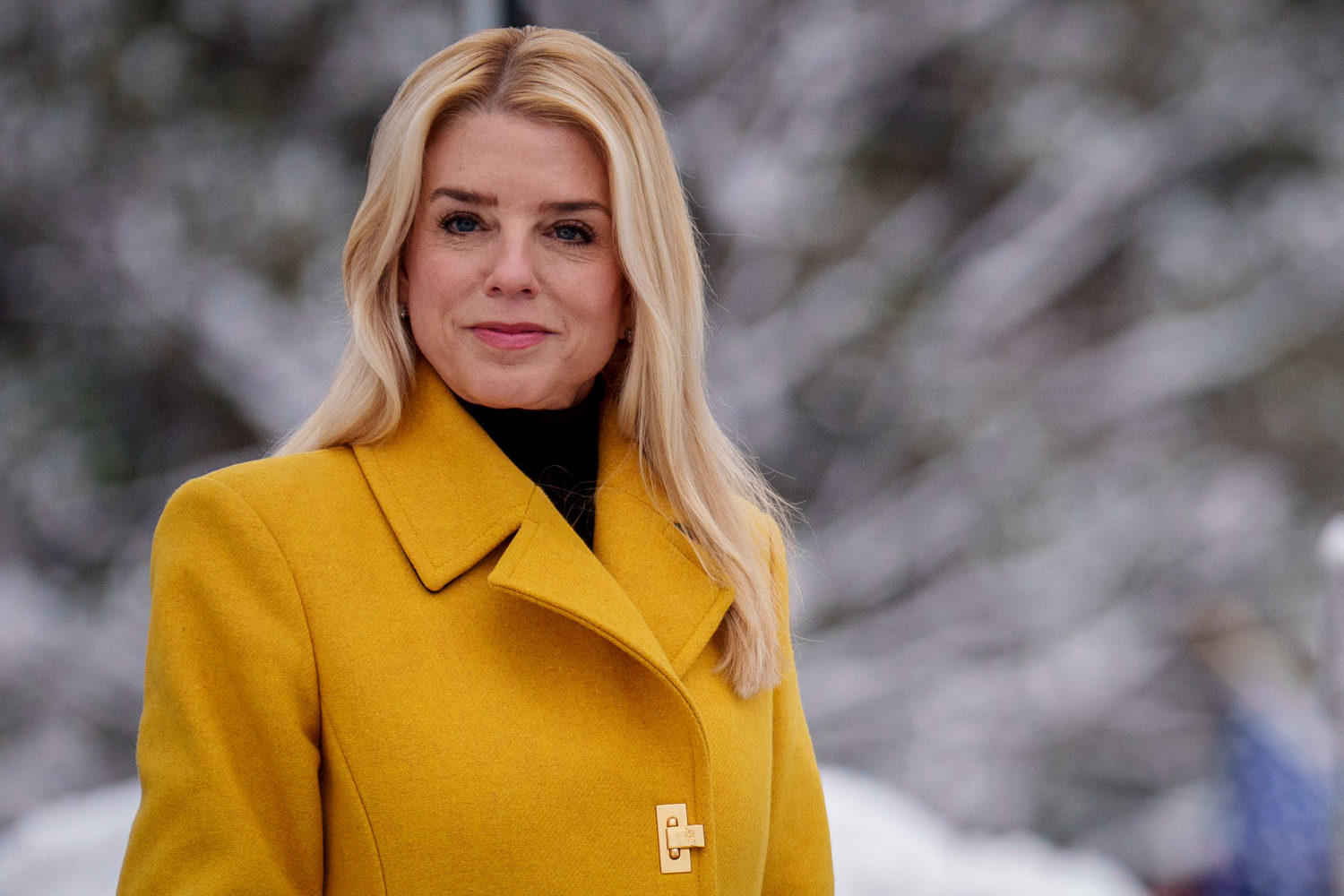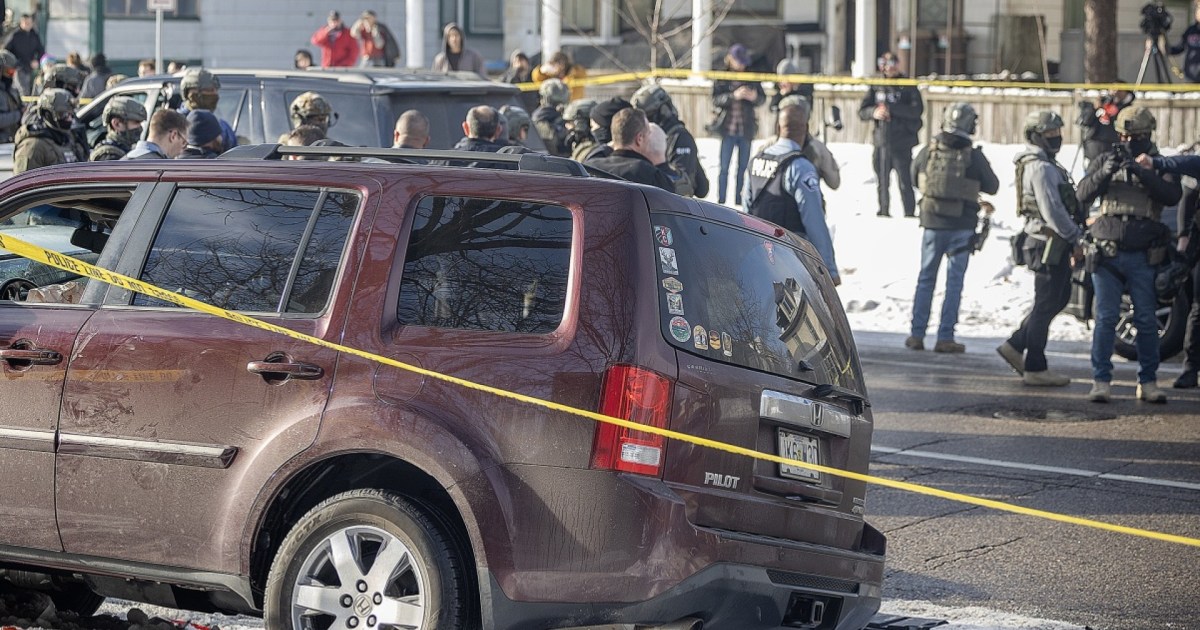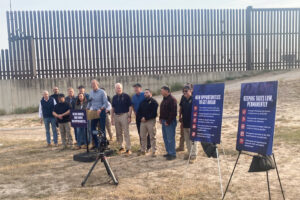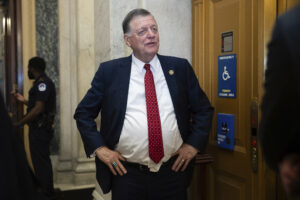The Dictatorship
Eric Adams just became the poster child for Pam Bondi’s new corruption stance

It has rarely hurt a politician’s fortunes to insist that they will clean up their opponent’s rampant abuse of power. Claims of waste, fraud and corruption are part and parcel with American politics, dating back to the earliest days of the republic. But while the second Trump administration is saying many of the right words, its first month makes clear that far from combating bribery and other forms of corruptionit has moved to ignore, underplay, or even embrace a blossoming culture of kickbacks.
Case in point: New York City Mayor Eric Adams was indicted last year on corruption charges. Federal prosecutors accused Adams of currying favor with Turkish officials and foreign businesspeople in exchange for flight upgrades, airline tickets and illegal campaign donations. The alleged grift was relatively low stakes, but corruption is corruption, and America’s laws have been shaped over the years to combat even the smallest-scale acts of alleged bribery, especially when it comes from overseas.
The alleged grift was relatively low stakes, but corruption is corruption
But on Monday, the Justice Department announced that it was asking prosecutors to drop the charges against Adamsframing the case as having unfairly impacted his coming bid to run for re-election this fall. The memo from acting Deputy Attorney General Emil Bove went out of its way to include a footnote insisting that “the Government is not offering to exchange dismissal of a criminal case for Adams’s assistance on immigration enforcement.”
But evidence of a quid pro quo has become clearer by the day. For starters, the DOJ announcement only came after Adams had reportedly told his commissioners in a Monday morning meeting not to criticize Trump or interfere with immigration enforcement in the city. Then, the mayor’s name was strangely missing from a list of New York officials the Justice Department sued on Wednesday over the state’s “sanctuary cities,” one of which Adams runs. “We’re hoping that in New York, that Mayor Adams is going to cooperate with us with the sanctuary cities and the illegal aliens,” Attorney General Pam Bondi said when announcing the suit, dangling the fact that the charges hadn’t been officially dropped yet as a reminder of what could lie in store for him.
And on Thursday, multiple federal prosecutors, including acting U.S. Attorney for the Southern District of New York Danielle R. Sassoon, resigned after refusing to follow orders to drop the charges against Adams. In a letter to Attorney General Pam BondiSassoon described a meeting attended by Bove, Adams’ lawyer and members of her office:
Adams’s attorneys repeatedly urged what amounted to a quid pro quo, indicating that Adams would be in a position to assist with Department’s enforcement priorities only if the indictment were dismissed. Mr. Bove admonished a member of my team who took notes during that meeting and directed the collection of those notes at the meeting’s conclusion.
Adams’ lawyer disputes Sassoon’s claims and the case remains on hold. But even should the case be dropped, polling shows that his odds of winning the Democratic primary this year are slim. The New York Times did report on Wednesday that Adams has been in discussion with a local GOP official about potentially running as a Republican in the fall, though Adams denied this in a written statement to the Times, saying he plans to run as a Democrat. Should the charges end up being dropped, Adams will unquestionably be far more indebted to Trumpthan he ever was to his overseas benefactors.
Suggesting that (allegedly) bribing the mayor of the country’s largest city is totally fine is just the most obvious sign of a growing climate of impunity under Trump. On Monday, the president signed an executive order that suspends a key anti-bribery law — the Foreign Corrupt Practices Act — which prohibits American companies and foreign firms from bribing foreign officials during the course of doing business.
At the most abstract level, claiming that American businesses can only get ahead by greasing the palms of foreign oligarchs or politicians is a terribly damning worldview.
The order argues that American national security depends on companies “gaining strategic business advantages whether in critical minerals, deep-water ports, or other key infrastructure or assets.” It also framed investigations into potential bribery as prosecutors being overly judgmental of “routine business practices in other nations.” And like most of Trump’s most legally or ethically dubious actions so far, the order further claims that the FCPA’s enforcement “impedes the United States’ foreign policy objectives and therefore implicates the President’s Article II authority over foreign affairs.”
At the most abstract level, claiming that American businesses can only get ahead by greasing the palms of foreign oligarchs or politicians is a terribly damning worldview. The law also just so happens to have affected billionaire Elon Musk’s businesses. As CNBC noted, the reference to “critical minerals” could be seen as a nod to the rare earth minerals that Tesla depends on; under the FCPA, several of Tesla’s suppliers have been hit with civil suits prompting settlements totaling more than $1.5 billion. (When CNBC asked whether Musk had a role in pushing for the order or its language, the White House declined to comment.)
Furthermore, some of the first memos Bondi signed after her confirmation as attorney general included orders to end the FBI’s Foreign Influence Task Force and scale back the enforcement of the Foreign Agents Registration Act. Bondi has also moved to transfer resources away from corruption-focused offices toward immigration enforcement instead.
This isn’t to imply that there is now free rein for foreign agents to run around Washington (or New York City) handing out large bags of cash with cartoon dollar signs on the side. But the welcome light is on for industrious nation-states and pliable politicians. We’ve already seen former Sen. Robert Menendez, D-N.J., offer up the same kind of claims of political targeting as Adams. While the mayor’s case may now never go to trial, Menendez’s Trumpian rhetoric has signaled an interest in his corruption conviction and sentence being erased. The question of whether corruption is tolerable in the U.S. is no longer whether it is legal, but whether it is of the sort that the president himself can stand to gain.
Hayes Brown is a writer and editor for BLN Daily, where he helps frame the news of the day for readers. He was previously at BuzzFeed News and holds a degree in international relations from Michigan State University.
The Dictatorship
Changes to the US vaccine recommendations are sowing confusion and could harm kids

Dr. Molly O’Shea has noticed growing skepticism about vaccines at both of her Michigan pediatric offices and says this week’s unprecedented and confusing changes to federal vaccine guidance will only make things worse.
One of her offices is in a Democratic area, where more of the parents she sees are opting for alternative schedules that spread out shots. The other is in a Republican area, where some parents have stopped immunizing their children altogether.
She and other doctors fear the new recommendations and the terminology around them will stoke vaccine hesitancy even more, pose challenges for pediatricians and parents that make it harder for kids to get shots, and ultimately lead to more illness and death.
The biggest change was to stop blanket recommendations for protection against six diseases and recommend those vaccines only for at-risk children or through something called “shared clinical decision-making” with a health care provider.
The phrase, experts say, is confusing and dangerous: “It sends a message to a parent that actually there’s only a rarefied group of people who really need the vaccine,” O’Shea said. “It’s creating an environment that puts a sense of uncertainty about the value and necessity or importance of the vaccines in that category.”
Health Secretary Robert F. Kennedy Jr.who helped lead the anti-vaccine movement for years, said in announcing the changes that they better align the U.S. with peer nations “while strengthening transparency and informed consent.”
But doctors say they are sowing doubt — the vaccines have been extensively studied and proven to be safe and effective at shielding kids from nasty diseases — at a time when childhood vaccination rates are already falling and some of those infectious diseases are spreading.
On Friday, the American Academy of Pediatrics and more than 200 medical, public health and patient advocacy groups sent a letter to Congress about the new childhood immunization schedule.
“We urge you to investigate why the schedule was changed, why credible scientific evidence was ignored, and why the committee charged with advising the HHS Secretary on immunizations did not discuss the schedule changes as a part of their public meeting process,” they wrote.
Many don’t know what ’shared decision-making’ means
O’Shea said she and other pediatricians discuss vaccines with parents at every visit where they are given. But that’s not necessarily “shared clinical decision-making,” which has a particular definition.
On its website, the Advisory Committee on Immunization Practices says: “Unlike routine, catch-up, and risk-based recommendations, shared clinical decision-making vaccinations are not recommended for everyone in a particular age group or everyone in an identifiable risk group. Rather, shared clinical decision-making recommendations are individually based and informed by a decision process between the health care provider and the patient or parent/guardian.”
In this context, health care providers include primary care physicians, specialists, physician assistants, nurse practitioners, registered nurses and pharmacists.
A pair of surveys conducted last year by the Annenberg Public Policy Center at the University of Pennsylvania suggested that many people don’t fully understand the concept, which came up last year when the federal government changed recommendations around COVID-19 vaccinations.
Only about 2 in 10 U.S. adults knew that one meaning behind shared decision-making is that “taking the vaccine may not be a good idea for everyone but would benefit some.” And only about one-third realized pharmacists count as health care providers to talk with during the process, even though they frequently administer vaccines.
As of this week, vaccines that protect against hepatitis A, hepatitis B, rotavirus, RSV, flu and meningococcal disease are no longer universally recommended for kids. RSV, hepatitis A, hepatitis B and meningococcal vaccines are recommended for certain high-risk populations; flu, rotavirus, hepatitis A, hepatitis B and meningococcal vaccines are recommended through shared decision-making — as is the COVID-19 vaccine, although that change was made last year.
Shortly after the federal announcement Monday, Dr. Steven Abelowitz heard from half a dozen parents. “It’s causing concern for us, but more importantly, concern for parents with kids, especially young kids, and confusion,” said Abelowitz, founder of Ocean Pediatrics in Orange County, California.
Though federal recommendations are not mandates — states have the authority to require vaccinations for schoolchildren — they can affect how easy it is for kids to get shots if doctors choose to follow them.
Under the new guidelines, O’Shea said, parents seeking shots in the shared decision-making category might no longer bring their kids in for a quick, vaccine-only appointment with staff. They’d sit down with a health care provider and discuss the vaccine. And it could be tougher to have a flu clinic, where parents drive up and kids get shots without seeing a doctor.
Staying the course as challenges mount
Still, doctors say they won’t let the changes stop them from helping children get the vaccines they need. Leading medical groups are sticking with prior vaccine recommendations. Many parents are, too.
Megan Landry, whose 4-year-old son Zackary is one of O’Shea’s patients, is among them.
“It’s my responsibility as a parent to protect my child’s health and well-being,” she said. “Vaccines are a really effective and well-studied way to do that.”
She plans to keep having the same conversations she’s always had with O’Shea before getting vaccines for Zackary.
“Relying on evidence and trusted medical guidance really helps me to make those decisions,” she said. “And for me, it’s not just a personal choice for my own son but a way to contribute to the health of everybody.”
But for other families, confidence about vaccines is waning as trust in science erodes. O’Shea lamented that parents are getting the message that they can’t trust medical experts.
“If I take my car to the mechanic, I don’t go do my own research ahead of time,” she said. “I go to a person I trust and I trust them to tell me what’s going on.”
Abelowitz, the California doctor, likened the latest federal move to pouring gasoline on a fire of mistrust that was already burning.
“We’re worried the fire’s out of control,” he said. “Already we’ve seen that with measles and pertussis, there are increased hospitalizations and even increasing deaths. So the way that I look at it — and my colleagues look at it — we’re basically regressing decades.”
___
The Associated Press Health and Science Department receives support from the Howard Hughes Medical Institute’s Department of Science Education and the Robert Wood Johnson Foundation. The AP is solely responsible for all content.
The Dictatorship
U.S. launches fresh strikes on ISIS targets in Syria

The U.S. has carried out “large-scale strikes” against multiple Islamic State targets in Syria along with partner forces, U.S. Central Command said on Saturday.
The attack is a part of an operation launched on Dec. 19, when U.S. forces struck “more than 70 targets” in central Syria as retaliation for the killing of three Americans by an ISIS gunman in early December.
“The strikes today targeted ISIS throughout Syria as part of our ongoing commitment to root out Islamic terrorism against our warfighters, prevent future attacks, and protect American and partner forces in the region,” CENTCOM said in a statement.
Tom Barrack, the Trump administration’s special envoy for Syria, announced on Saturday that he met with Syria’s new leadership in Damascus “to discuss recent developments in Aleppo and the broader path forward for Syria’s historic transition.”
The deadly attack in December marked the first fatalities of U.S. troops in the country since former President Bashar al-Assad was ousted last year. Three other U.S. service members were injured in the attack in December, and a state-run news agency reported that two members of the Syrian security forces were also wounded.
President Donald Trump said at the time that the attack by ISIS took place “in a very dangerous part of Syria, that is not fully controlled by them.” He also said Syrian President Ahmed al-Sharaa, whom he had met in November at the White House, was “extremely angry and disturbed by this attack.”
Defense Secretary Pete Hegseth said last month that the operation was “a declaration of vengeance” over the deaths of the American service members.
This is a developing story. Please check back for updates.
Clarissa-Jan Lim is a breaking news reporter for MS NOW. She was previously a senior reporter and editor at BuzzFeed News.
The Dictatorship
When it comes to ICE encounters, what are the rules — and your rights?

In the wake of Renee Nicole Good’s death, Americans are asking, with heightened urgency, what authority ICE and CBP agents have when they engage with U.S. citizens. And as with many areas of the law, the answer is largely, “It depends.”
Can ICE use deadly force on U.S. citizens – or ever?
When it comes to the use of force, and specifically, the use of firearms, ICE has its own specific policy that was last updated in 2023. That policy was filed in the Chicago-area litigation over ICE and CBP’s treatment of protesters, clergy, and journalists. (Interestingly, on ICE’s website, that same policy is almost entirely redacted.) This policy does not vary depending on the subject’s immigration or citizenship status. Here’s what it says:
First, the policy authorizes the use of force “only when no reasonably effective, safe, and feasible alternative appears to exist and may use only the level of force that is objectively reasonable in light of the totality of facts and circumstances confronting the officer at the time force is applied.” But the policy is equally clear that an officer does not have to meet force with equal or lesser force, does not have to wait for an attack before using force, and does not have any duty to retreat to avoid the reasonable use of force.
Second, where feasible and without creating any greater threat to his own safety or that of others, an ICE officer must attempt to “de-escalate by the use of communication or other techniques during an encounter to stabilize, slow, or reduce the intensity of a potentially violent situation without using physical force, or with a reduction in force.”
Third, ICE policy is also clear that officers have a “duty to intervene to prevent or stop a perceived use of excessive force” so long as it is safe to do so. It further states that a failure to intervene and/or report such incidents is itself misconduct — and potential grounds for discipline.
What’s the guidance if U.S. citizens are given orders by ICE?
Short of using force or deadly force, however, can ICE give orders to U.S. citizens? For example, it appears that ICE agents directed Renee Nicole Good to get out of her car shortly before she was killed.
ICE can give orders to U.S. citizens, but again, only in limited circumstances that are directly tied to the ICE agent’s immigration-related authority. For example, ICE can give orders to U.S. citizens — or even detain them temporarily — if they are obstructing or interfering with immigration enforcement activity.
These situations are often very subjective. U.S. citizens do have significantly more freedom in their interactions with ICE than non-citizens. For example, according to guidance issued by the ACLU and the City of New Yorkamong others, if ordered or detained by ICE, a U.S. citizen can ask, “Am I free to leave?” and they should then be allowed to leave on their own free will.
Can ICE agents search a car without a warrant?
ICE agents also have the authority to search a car without a warrant in limited scenarios. The Fourth Amendment includes the automobile exceptionwhich allows federal agents to search a vehicle without a warrant if there’s probable cause to believe there’s evidence to a crime or contraband. Because a car can be driven away quickly, it may not be practical to secure a warrant beforehand without jeopardizing the investigation.
But federal agents must have specific probable cause to search a car without a warrant. A hunch or a feeling that the car conceals evidence of illegal activity is not enough for a federal agent to search a car without a warrant. ICE does have broader authority to search vehicles within 100 miles of the U.S. border, but even so, these searches typically require probable cause. Notably, ICE cannot search a car without a warrant simply because they suspect someone may be an undocumented immigrant.
However, car searches are the only major exception. ICE officers require search warrants for all other searches. Without a warrant, both U.S. citizens and non-citizens can say, “I do not consent to a search,” according to guidance issued by immigration rights organizations.
What’s the guidance on U.S. citizens recording or taking photos of ICE during enforcement activities?
Civil liberties groups generally advise that under the First Amendment, U.S. citizens can record or take photos of ICE performing law enforcement activities in public places so long as the recording does not interfere with ICE activity, like an arrest. Bystanders are allowed by law to collect important information, including names and badge numbers of the ICE agent executing the immigration activity.
Some states, including Florida, Tennessee, and Louisiana, have enacted their own laws requiring observers — or anyone else — to move back 25 feet or more from law enforcement or other first responders upon their request. While other, similar laws passed by Arizona and Indiana have been struck down, the constitutionality of these states’ laws has not been determined.
Finally, citizens and non-citizens alike share one fundamental right when it comes to encounters with ICE, or any other law enforcement agency, for that matter: the right to remain silent.
Lisa Rubin is MS NOW’s senior legal reporter and a former litigator.
Fallon Gallagher is a legal affairs reporter for MS NOW.
-

 The Dictatorship11 months ago
The Dictatorship11 months agoLuigi Mangione acknowledges public support in first official statement since arrest
-

 The Dictatorship4 months ago
The Dictatorship4 months agoMike Johnson sums up the GOP’s arrogant position on military occupation with two words
-

 Politics11 months ago
Politics11 months agoBlue Light News’s Editorial Director Ryan Hutchins speaks at Blue Light News’s 2025 Governors Summit
-

 Politics11 months ago
Politics11 months agoFormer ‘Squad’ members launching ‘Bowman and Bush’ YouTube show
-

 Politics11 months ago
Politics11 months agoFormer Kentucky AG Daniel Cameron launches Senate bid
-

 The Dictatorship11 months ago
The Dictatorship11 months agoPete Hegseth’s tenure at the Pentagon goes from bad to worse
-
Uncategorized1 year ago
Bob Good to step down as Freedom Caucus chair this week
-

 Politics9 months ago
Politics9 months agoDemocrat challenging Joni Ernst: I want to ‘tear down’ party, ‘build it back up’





